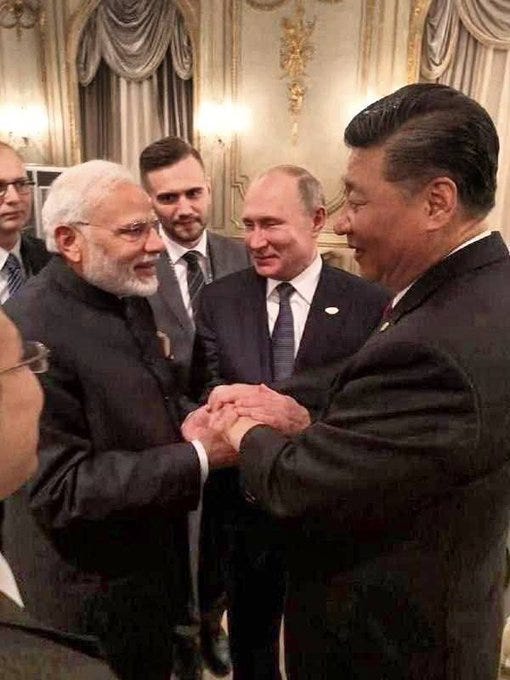The Dawning of a New World Order
Many Western political leaders and pundits continue to indulge themselves in the fantasy that the US is in control of its destiny and is an unbreakable hegemon. You may accuse me of exaggerating, but I am shocked by the number of seemingly sane, sober, well-educated Americans who continue to believe that the relationship between Russia and China is ephemeral, and that with just the right amount of pressure Russia will be easily persuaded to abandon China and join the West in its plan to subdue the Chinese government and people. It is a bat shit crazy notion in my opinion, but there are a large number of folks who embrace this nonsense.
As I am writing this piece, the Shanghai Cooperation Organization (SCO) conference is underway and a new chapter in the history of international politics is being written. The SCO has ten member states: China, India, Pakistan, Russia, Kazakhstan, Kyrgyzstan, Tajikistan, Uzbekistan, Iran, and Belarus. Additionally, it has two observer states, Afghanistan and Mongolia, along with several dialogue partners. This year the attendees also include Armenia, Azerbaijan and Turkey. I suspect those three were sent by their Western masters to spy on the event and report back.
Donald Trump’s foreign policy is turning into a serial production of debacles. Case in point: India. The short-sighted decision to hit India with 25% tariffs, and an additional 25% penalty, has energized India’s political class to distance themselves from the United States. A year ago, I could make a cogent case that India was lukewarm about its relationship with BRICS, but that has all changed. Prime Minister Modi, on behalf of his government, now assumes the Presidency of BRICS, and is embracing the task of planning and hosting the 2026 BRICS summit in India. He will not submit to US threats or bullying.
As part of moving BRICS forward, India’s longstanding, contentious relationship with China is in the process of being revamped, with India and China now behaving more as friends than as enemies. The photo at the top of this article tells the story about the new relationship, as does this early press report:
“Always a delight to meet President Putin,” Prime Minister Modi posted on X after his meeting with the Russian leader ahead of the summit.
In another post on X, Modi wrote: “Interactions in Tianjin continue! Exchanging perspectives with President Putin and President Xi during the SCO Summit.”
China’s President Xi, in his opening remarks, made it clear that the SCO is not just a pleasant social gathering for Asian leaders and those leaders representing countries that were once part of the Soviet Union:
China will work with all parties in the Shanghai Cooperation Organisation to take the regional security forum to a new level, Chinese President Xi Jinping said on Monday, unveiling his ambition for a new global security order that poses a challenge to the United States.
The Shanghai Cooperation Organisation has set a model for a new type of international relations, Xi said in opening remarks addressing more than 20 world leaders at a two-day summit held in northern China’s Tianjin, adding that the forum unequivocally opposed external interference.
BRICS, along with the SCO, is busy constructing an alternative to the post-WW II international economic and political system that has dominated world affairs for the last 80 years. While many in the West foolishly dismiss these gatherings as meaningless, Russia, China and India are quite serious about creating an economic, financial and international political system that is no longer subject to a veto by the United States or Europe. The fact that they represent the most dynamic and innovative economies in the world today should be enough to entice the West to find a path for cooperation with them. Nope! With Washington in the lead, and the Europeans tagging along behind, the West is committed to a policy of confrontation and punishment. The US-tariffs imposed on India are just the latest example.
Randy Credico, a comedian, political activist and friend, hosted me and Andrei Martyanov on his weekly radio program, which broadcasts from New York City. Andrei and I discussed the Great Patriotic War and its relevance to the current war in Ukraine:



On the day that Trump promised consequences for Russia if there was no cease-fire in Ukraine, he hosted the signing of a peace deal, including the naming of something now supposedly called the Trump Corridor, between Azerbaijan and Armenia. Whoever brokered that deal knew how to flatter The Donald.
Since then, the UK has signed a military agreement with Armenia, which connects a piece of the territory required for a pipeline bringing all the BP-extracted oil westward and avoiding Russia, underscoring also the strategic significance of the Black Sea (and vulnerability of Crimea to attack, as highlighted by Stephen Bryen).
The West’s meddling in this area also coincidentally threatens the viability of the International North South Transport Corridor linking Russia and Iran by rail via Azerbaijan. India would stand to benefit from the INSTC as the location of the port linking with Iran. This would ultimately complement the Arctic corridor already opening up as an alternative to the Suez Canal (cheaper and faster and less exposed to Western interference).
To my mind the SCO, from its beginning, has had one clear goal: the reduction and ultimate removal of the US from Central Asia. Perhaps Turkey, Armenia and Azerbaijan will be given the opportunity to glimpse a more peaceful and prosperous future of which they could be a part, if they resist whatever siren songs are being piped in their direction by the West.